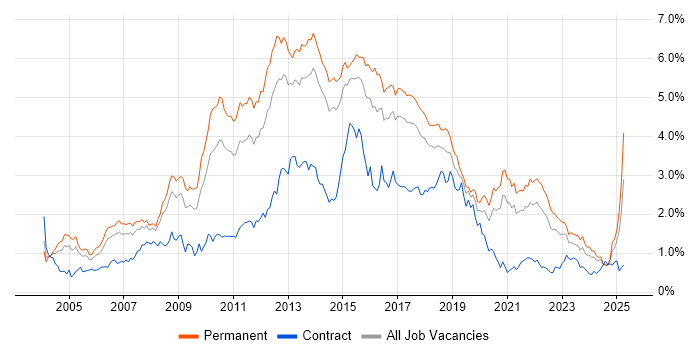Transact-SQL
England > Yorkshire
The table below provides summary statistics for permanent job vacancies advertised in Yorkshire requiring T-SQL skills. It includes a benchmarking guide to the annual salaries offered in vacancies that cited T-SQL over the 6 months leading up to 30 April 2025, comparing them to the same period in the previous two years.
| 6 months to 30 Apr 2025 |
Same period 2024 | Same period 2023 | |
|---|---|---|---|
| Rank | 102 | 147 | 189 |
| Rank change year-on-year | +45 | +42 | -100 |
| Permanent jobs citing T-SQL | 45 | 71 | 124 |
| As % of all permanent jobs advertised in Yorkshire | 1.68% | 1.23% | 1.50% |
| As % of the Programming Languages category | 6.37% | 4.34% | 3.33% |
| Number of salaries quoted | 43 | 66 | 102 |
| 10th Percentile | £51,250 | £31,250 | £42,500 |
| 25th Percentile | £57,500 | £37,211 | £45,188 |
| Median annual salary (50th Percentile) | £60,000 | £53,750 | £52,000 |
| Median % change year-on-year | +11.63% | +3.37% | +4.00% |
| 75th Percentile | £62,500 | £62,500 | £65,000 |
| 90th Percentile | £65,000 | £71,250 | £68,750 |
| England median annual salary | £57,500 | £55,000 | £57,500 |
| % change year-on-year | +4.55% | -4.35% | +4.55% |
All Programming Languages
Yorkshire
T-SQL falls under the Programming Languages category. For comparison with the information above, the following table provides summary statistics for all permanent job vacancies requiring coding skills in Yorkshire.
| Permanent vacancies with a requirement for coding skills | 706 | 1,636 | 3,728 |
| As % of all permanent jobs advertised in Yorkshire | 26.41% | 28.39% | 45.18% |
| Number of salaries quoted | 576 | 1,359 | 1,636 |
| 10th Percentile | £29,750 | £31,850 | £35,000 |
| 25th Percentile | £38,500 | £40,000 | £41,250 |
| Median annual salary (50th Percentile) | £52,500 | £50,000 | £55,000 |
| Median % change year-on-year | +5.00% | -9.09% | +4.76% |
| 75th Percentile | £73,000 | £65,000 | £72,500 |
| 90th Percentile | £93,764 | £77,500 | £85,000 |
| England median annual salary | £62,000 | £60,000 | £65,000 |
| % change year-on-year | +3.33% | -7.69% | +4.00% |
T-SQL
Job Vacancy Trend in Yorkshire
Job postings citing T-SQL as a proportion of all IT jobs advertised in Yorkshire.

T-SQL
Salary Trend in Yorkshire
3-month moving average salary quoted in jobs citing T-SQL in Yorkshire.
T-SQL
Salary Histogram in Yorkshire
Salary distribution for jobs citing T-SQL in Yorkshire over the 6 months to 30 April 2025.
T-SQL
Job Locations in Yorkshire
The table below looks at the demand and provides a guide to the median salaries quoted in IT jobs citing T-SQL within the Yorkshire region over the 6 months to 30 April 2025. The 'Rank Change' column provides an indication of the change in demand within each location based on the same 6 month period last year.
| Location | Rank Change on Same Period Last Year |
Matching Permanent IT Job Ads |
Median Salary Past 6 Months |
Median Salary % Change on Same Period Last Year |
Live Jobs |
|---|---|---|---|---|---|
| West Yorkshire | +34 | 24 | £60,000 | +9.09% | 4 |
| South Yorkshire | +52 | 14 | £60,000 | +20.00% | |
| North Yorkshire | +1 | 7 | £60,000 | +44.58% | 4 |
| T-SQL England |
|||||
T-SQL
Co-occurring Skills and Capabilities in Yorkshire by Category
The follow tables expand on the table above by listing co-occurrences grouped by category. The same employment type, locality and period is covered with up to 20 co-occurrences shown in each of the following categories:
